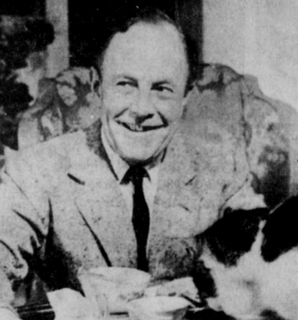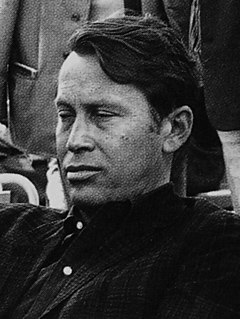A Quote by Jeff Cooper
The criminal does not expect his prey to fight back. May he never choose you, but, if he does, surprise him.
Related Quotes
Scientific discovery is a private event, and the delight that accompanies it, or the despair of finding it illusory, does not travel. One scientist may get great satisfaction from another's work and admire it deeply; it may give him great intellectual pleasure; but it gives him no sense of participation in the discovery, it does not carry him away, and his appreciation of it does not depend on his being carried away. If it were otherwise the inspirational origin of scientific discovery would never have been in doubt.
A man's real faith is never contained in his creed, nor is his creed an article of his faith. The last is never adopted. This it is that permits him to smile ever, and to live even as bravely as he does. And yet he clings anxiously to his creed, as to a straw, thinking that that does him good service because his sheet anchor does not drag.
The Latin American has no tribe to fall back on, as the African does, no reliable judiciary to defend his rights as the European does, no social ideal or sacred constitution as the North American does, no pervasive mythology to soften life as it does in Asia, and no even an ideology to subscribe to, as does the Russian or Chinese. Without wealth, what is there left to him but his manhood, to be flaunted and defended at every occasion?
The wise man does nothing but what can be done openly and without falseness, nor does he do anything whereby he may involve himself in any wrong-doing, even where he may escape notice. For he is guilty in his own eyes before being so in the eyes of others; and the publicity of his crime does not bring him more shame than his own consciousness of it.
God never punishes his children in the sense of avenging justice. He chastens as a father does his child, but he never punishes his redeemed as a judge does a criminal. It is unjust to exact punishment from redeemed souls since Christ has been punished in their place. How shall the Lord punish twice for one offense?
The citizen who thinks he sees that the commonwealth's political clothes are worn out, and yet holds his peace and does not agitate for a new suit, is disloyal, he is a traitor. That he may be the only one who thinks he sees this decay, does not excuse him: it is his duty to agitate anyway, and it is the duty of others to vote him down if they do not see the matter as he does.
Grown-ups love figures... When you tell them you've made a new friend they never ask you any questions about essential matters. They never say to you "What does his voice sound like? What games does he love best? Does he collect butterflies? " Instead they demand "How old is he? How much does he weigh? How much money does his father make? " Only from these figures do they think they have learned anything about him.
Proust writes, he remembers, physically. He depends on his body to give him the information that will bring him to the past. His book is called 'In Search of Lost Time,' and he does it through the senses. He does it through smell. He does it through feeling. He does it through texture. It is all physically driven, that language.
Therefore, the truly great man, although he does not injure others, does not credit himself with charity and mercy (these are natural to him). He does not seek gain, but does not despise his followers who do. He struggles not for wealth, but does not take credit for leaving it alone... The ranks and emoluments of the world are to him no cause for joy, it's punishments and shame no cause for disgrace.
Let us remember, there is One who daily records all we do for Him, and sees more beauty in His servants' work than His servants do themselves... And then shall His faithful witnesses discover, to their wonder and surprise, that there never was a word spoken on their Master's behalf, which does not receive a reward.
The Landlord is a gentleman who does not earn his wealth. He has a host of agents and clerks that receive for him. He does not even take the trouble to spend his wealth. He has a host of people around him to do the actual spending. He never sees it until he comes to enjoy it. His sole function, his chief pride, is the stately consumption of wealth produced by others.



































